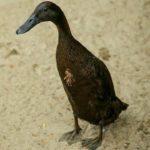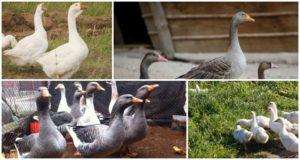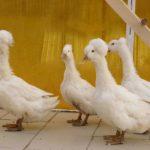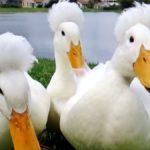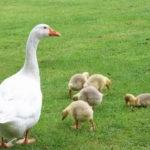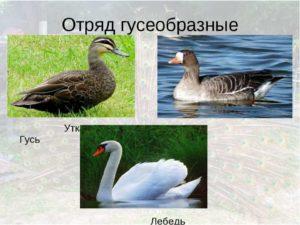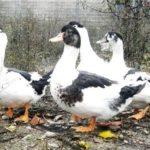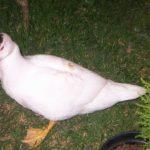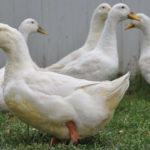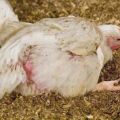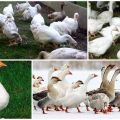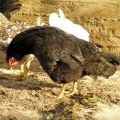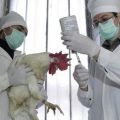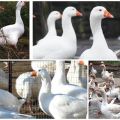Symptoms and treatment of diseases of goslings at home
Diseases in goslings are identified based on symptoms and treatment at home is immediately started. The most dangerous are infectious diseases. For their prevention, birds are given vaccines in the first days of life. Infections are fought with antibiotics. Non-communicable diseases are caused by unsanitary conditions and feeding geese with poor-quality feed.
Diseases of little goslings dangerous to humans and their treatment
Infectious diseases of geese, especially in the early stages of life, can lead to the death of birds. Viruses, bacteria, fungi and parasites that infect goslings are also dangerous to human health. It is advisable to prevent the development of infectious diseases, that is, to take a number of preventive measures. Treat all infections with antibiotics. You can buy Baytril, Levomycetin or Bitsillin-3 and add it to drinking water at the first sign of illness in geese.
Viral enteritis
Enterovirus infects only incubated geese up to three weeks old. The pathogen is cultivated even on goose embryos; sick and ill birds are the source of infection. Sick goslings lose their appetite. Birds sit motionless in one place, sneeze, they may have snot. In addition to a runny nose, sick chicks have diarrhea, dermatitis, and feather loss. Geese die on the 5-14th day of life.
Salmonellosis
This infectious disease is especially dangerous for goslings up to 1 month old. Sick birds and pets can be sources of infection. The bacteria that cause the disease live for a long time in droppings, water bodies, and soil. Salmonellosis can be recognized by the depression and inactivity of birds, nasal discharge, white diarrhea. In sick goslings, convulsions are observed, chicks fall to one side, jerk their paws. More than 50 percent of diseased birds die.
All you need to do in this case is to give the goslings an antibiotic water. For the treatment of birds, you can use "Levomycetin", "Enrofloxacin", "Baytril", "Gentamicin sulfate", "Furazolidone", "Furagin". Antibacterial agents are given to sick birds for 5 days. In parallel, probiotics (Bifinorm, Bifidumbacterin) are prescribed to goslings for 7-14 days.As a prophylaxis, a drug called "Vaccine against salmonellosis of waterfowl" is dripped into the mouth for 2-3 days of life.
Colibacillosis
Colibacillosis is caused by intestinal bacteria. The pathogen lives in droppings, contaminated feed, bedding and even on the surface of eggs. Symptoms: lethargy, refusal to eat, diarrhea, discharge from the eyes, in severe cases, pneumonia and fever are possible. Goslings die without treatment. The birds are treated with antibiotics (drugs are added to drinking water). Additionally, probiotics are prescribed to goslings. As a preventive measure, geese are given a vaccine against colibacillosis.
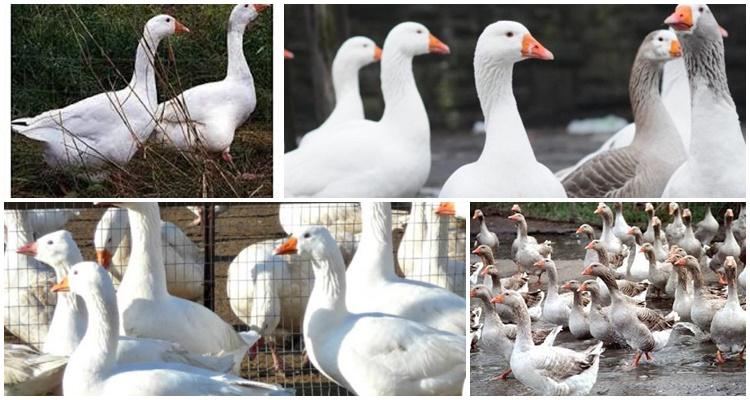
Pasteurellosis
The bacteria that cause the death of young geese can live on the shell, in the droppings, on the litter. Pathogens are transmitted from sick and ill birds. Sick goslings refuse food, breathe heavily, wheeze, have nasal discharge and diarrhea.
Antibiotics are used for treatment ("Levomycetin", "Bitsillin-3"). For prevention, live vaccines are used.
Coccidiosis
The disease is caused by parasitic protozoa. Sick birds are sources of infection. Pathogens can live in feed, soil, bedding. Infection occurs through the digestive tract. Goslings get sick at 7-30 days of age. Affected chicks have depression, diarrhea, and lack of appetite. For the treatment of eimeriosis, "Koktsidin", "Iramin", "Rigekoktsin", "Robenidin" are prescribed.
Aspergillosis
The disease is caused by pathogenic fungi. Pathogens can live on litter, soil, and forage. Goslings that live in poorly ventilated poultry houses often suffer from this disease. Fungal spores inhaled by geese germinate in the respiratory system. Sick goslings are inactive, breathe heavily, they have wheezing, coughing, conjunctivitis, diarrhea, and convulsions. For treatment, antifungal drugs ("Gamycin") are used.
Infectious cloacitis (neisseriosis)
A bacterial disease that can be recognized by hyperemia of the cloacal mucosa, the formation of fibrinous scabs, bleeding erosions, swelling of the affected tissues, inflammation of the penis. Geese become infected during the mating season and through infected litter. For treatment use antibiotics ("Bitsillin-3", "Levomycetin").
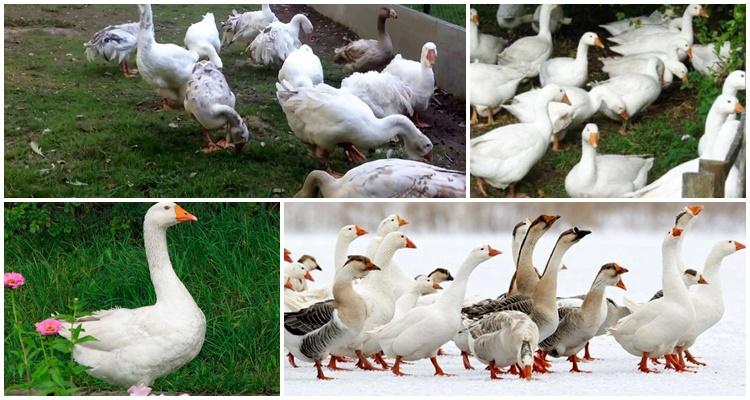
Worms
Goslings can become infected with worms, the eggs of which are found in dirty litter, soil, and poor-quality feed. On the 7-14th day of bird life, it is recommended to add an anthelmintic agent ("Levamisole", "Tetramisole") to the water for prevention purposes. Repeated deworming is carried out every 2-3 months.
Diseases not dangerous to humans
Some diseases of goslings are not dangerous to humans. True, diseases often arise through the fault of people (as a result of improper feeding and poor care of the bird).
Avitaminosis D
The disease develops with a deficiency of ultraviolet radiation and vitamins in feed. If the goslings get sick with vitamin deficiency, then they have rickets, growth retardation, curvature of bones. The disease can be prevented by giving the chicks cottage cheese from the moment of birth, as well as adding calcium, chalk, pharmaceutical preparations with vitamin D to the feed.
Stomatitis
The disease occurs with poor feeding of geese and a lack of vitamins. With stomatitis in goslings, inflammation of the mucous membrane, stretching of the bottom of the mouth, and prolapse of the tongue are observed. A putrid smell emanates from the mouth of a sick bird. It is recommended to treat geese for stomatitis by cleansing the oral cavity from feed masses and rinsing with a disinfectant (Rivanol, Furacilin, herbal decoction).
Diarrhea
Diarrhea occurs due to some kind of infectious disease or as a result of feeding poor-quality (moldy, sour) feed.Diarrhea occurs in birds that are kept in unsanitary conditions or swim in muddy ponds. Signs of illness: frequent bowel movements, yellowish-green liquid feces.
With the infectious nature of the disease, birds are drunk with water and antibiotics. In the course of treatment, errors in feeding and keeping geese must be eliminated. In case of diarrhea caused by poor-quality feed, birds are given weak disinfectant solutions (lactic, succinic acid, potassium iodide, iron sulfate). Be sure to prescribe probiotics ("Bifido-bacterin") or feed with cottage cheese, yogurt.
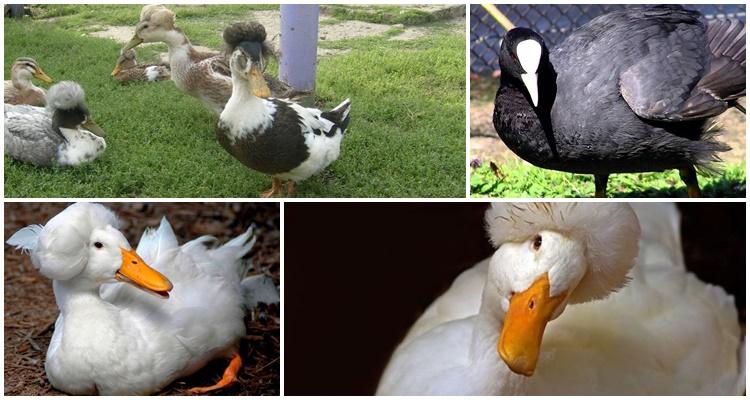
Cannibalism
The disease occurs as a result of metabolic disorders and increased excitability of the nervous system of geese. Cannibalism can be caused by a lack of protein, amino acids, vitamins and minerals. The desire to peck each other in birds arises at the sight of blood or due to starvation. Signs of cannibalism are bleeding wounds.
From the moment of birth, geese must be provided with complete feed. This is the main event for the prevention of cannibalism. At the time of exacerbations, anti-stress premixes are added to the feed.
Blockage of the esophagus
In the event of a blockage, the esophagus overflows with feed. Muscular atony and obstruction are observed. The disease occurs in young birds that are fed with dry food and are not taken out on a boat trip or grazing. Grain stagnates in the esophagus of birds, and when moisture gets inside, it swells. In severe cases, asphyxiation is possible.
As a treatment, it is recommended to clear the esophagus from the fodder masses, introduce vegetable oil inside, do not feed the birds for 24 hours. For cleansing, massage and rinsing with vodka are prescribed. For prevention purposes, it is advisable to always give feed at the same time as water.
Non-infectious cloacite
Inflammation of the mucous membrane of the cloaca is observed in geese during the period of intensive egg-laying. The cause of the disease is the unsanitary keeping of geese, trauma to the oviduct. In sick birds, egg-laying decreases or stops, defecation becomes difficult. Feathers become dirty and fall out near the cloaca. Treatment begins with cleansing procedures. The cloaca is cleaned with petroleum jelly and a decoction of herbs. Tampons with syntomycin ointment are injected inside.
